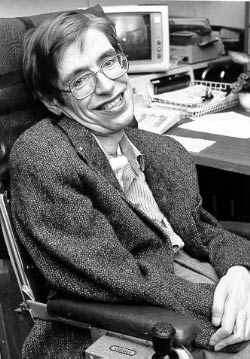Stephen Hawking Biography
Stephen Hawking is an English theoretical physicist, cosmologist and author. He is best known for his attempts to explain in clear terms the origins of the universe and some of the most complicated aspects of the cosmos and physics. Hawkings was the first scientist to offer a theory of cosmology explained by a union of the general theory of relativity and quantum mechanics.
Early life Stephen Hawking
Stephen William Hawking was born on 8 January 1942 in Oxford, England. His family had moved to Oxford to escape the threat of V2 rockets over London. As a child he showed prodigious talents, if unorthodox study methods. On leaving school he got a place at University College, Oxford University where he studied Physics. His physics tutor at Oxford, Robert Berman, later said that Stephen Hawkins was an extraordinary student. He used few books and made no notes, but could work out theorems and solutions in a way other students couldn’t.
“My goal is simple. It is a complete understanding of the universe, why it is as it is and why it exists at all.”
– Stephen Hawking’s Universe (1985) by John Boslough, Ch. 7
 On gaining a B.A.Hons in Physics he briefly stayed to study Astronomy but was not interested in observing sun spots so moved to Trinity College, Cambridge where he was able to pursue his passion for theoretical astronomy and cosmology.
On gaining a B.A.Hons in Physics he briefly stayed to study Astronomy but was not interested in observing sun spots so moved to Trinity College, Cambridge where he was able to pursue his passion for theoretical astronomy and cosmology.
It was in Cambridge that Stephen Hawking first started to develop symptoms of neuro muscular problems – a type of motor neuron disease. This quickly affected his physical ability. His speech became slurred and he become unable to even feed himself. At one stage, the doctors gave him a life span of three years. However, the progress of the disease slowed down and he has managed to overcome his severe disability to continue his research and active public engagements. At Cambridge a fellow scientist developed a synthetic speech device which enabled him to speak by using a touch pad. Nevertheless, it can still be a time consuming process for him to communicate. Stephen Hawking has taken a pragmatic view to his disability
“It is a waste of time to be angry about my disability. One has to get on with life and I haven’t done badly. People won’t have time for you if you are always angry or complaining. ” The Guardian (27 September 2005)
Stephen Hawking’s principle fields of research have been involved in theoretical cosmology and quantum gravity.
Amongst many other achievements, he developed a mathematical model for Einstein’s General Theory of Relativity. He has also undertook a lot of work on the nature of the Universe, The Big Bang and Black Holes.
Despite being one of the best physicists of his generation, he has also been able to translate difficult physics models into a general understanding for the general public. His books – A Brief History of Time and The Universe in A Nutshell have both became runaway bestsellers – with aBrief History of Time being in the Bestsellers lists for over 230 weeks. In his books, Hawking tries to explain scientific concepts in everyday language, and give an overview to the workings behind the cosmos.
“The whole history of science has been the gradual realization that events do not happen in an arbitrary manner, but that they reflect a certain underlying order, which may or may not be divinely inspired.”
– A Brief History of Time (1998) ch. 8
Stephen Hawking has become one of the most famous scientists of his generation. He makes frequent public engagements and his portrayed himself in popular media culture from programmes such as the Simpsons to Star Trek.
He married Jane Wilde, a language student in 1965. He said this was a real turning point for him at a time when he was fatalistic because of his illness. They later divorced but had three children.
EmoticonEmoticon